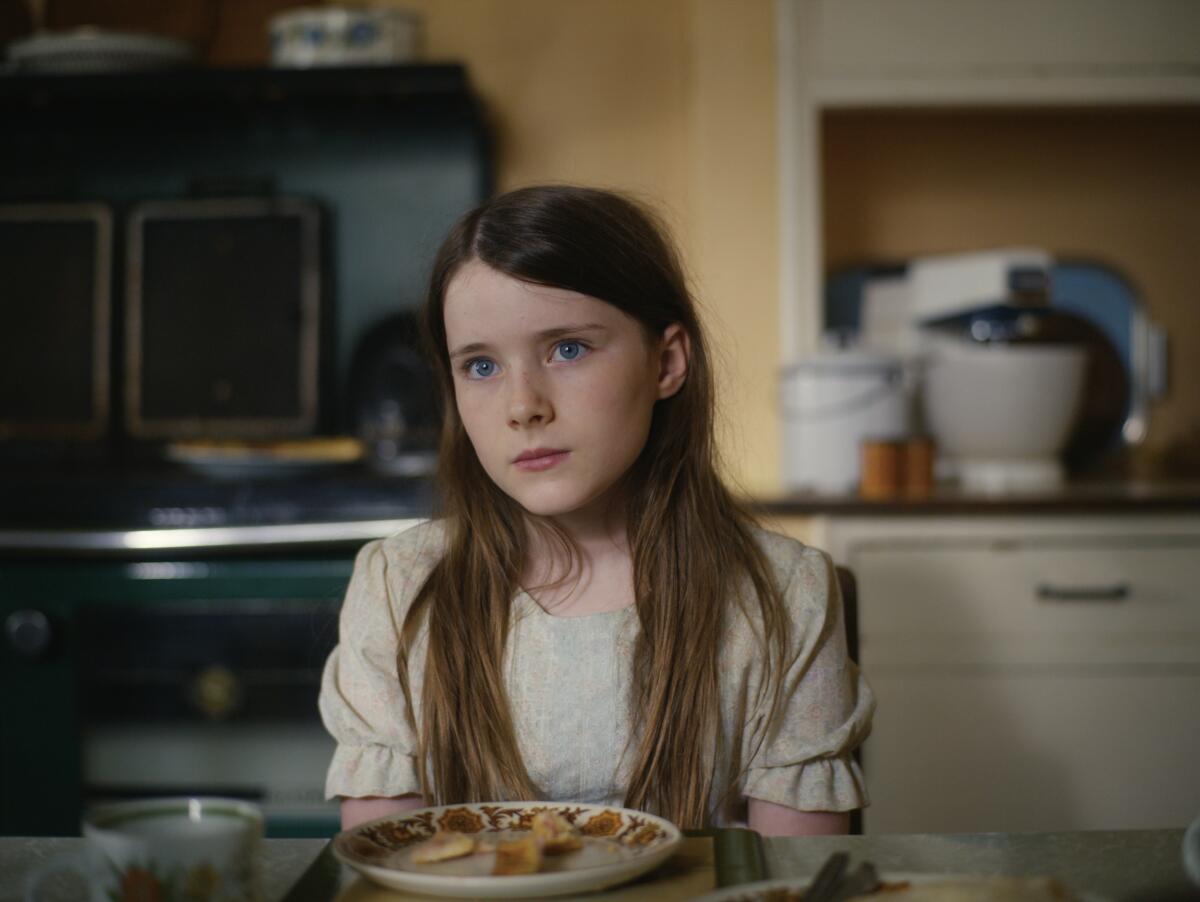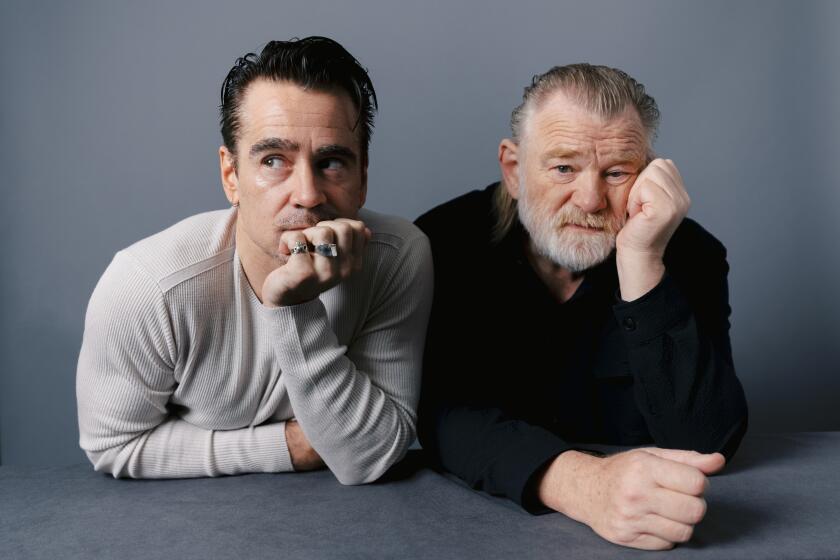Ireland’s ‘Green Wave’ rolls into Hollywood
Illustration by Chanelle Nibbelink / For The Times
- Share via
Ireland has a proud tradition of Academy Award prominence — famed dual Irish-British citizen Daniel Day-Lewis is the only man with three lead actor Oscars, after all — but the country’s ties to 14 nominations this season has catapulted it to new heights.
Consider: “The Banshees of Inisherin” earned nine nods; Irish-language film “The Quiet Girl” (“An Cailín Ciúin”) has earned a place among the international feature film nominees; and “An Irish Goodbye” is a live action short film nominee. Then there’s the people involved. Nominations were bestowed on actors Paul Mescal (“Aftersun”); the primary cast of “The Banshees of Inisherin” — Colin Farrell, Brendan Gleeson, Kerry Condon and Barry Keoghan — along with “Elvis” film editor Jonathan Redmond and Richard Baneham, visual effects supervisor for “Avatar: The Way of Water.”
The actors, good friends in real life, disagree about how best to live life and what leaving a legacy really means.
“Banshees” writer-director Martin McDonagh — himself a nominee for original screenplay, director and best picture — describes its success as “beyond my understanding; the connection people have found, the discourse and reaction. It’s almost like it’s not mine at all anymore.” His own luck of the Irish includes an actual rainbow amid his pot of (potential) gold during last year’s shoot. “I’ve never seen such a beautiful summer. All those sunsets are for real and the rainbow at the start too.”

But he’s most enthralled with the nominations for his four actors, calling Farrell and Gleeson among Ireland’s current “top four, definitely,” while Keoghan’s “already up there. And I’ve been seeing what Kerry’s been doing in theater and films for 20 years, so I’ve known how brilliant she is. There isn’t anyone I’d hire instead of her I think — not just in Ireland, in the world.”
“That’s so sweet,” Condon says when told of McDonagh’s comment. “I think from the beginning when we met — I was doing his play ‘The Lonesome West’ when I was 17 — Martin always admired my ambition, because it was similar to his. I was always sure of myself; childlike and cocky, like, ‘I’m going global.’” Now her excitement for the Emerald Isle feels almost palpable. “My friend at home was like, ‘Everybody’s celebrating like crazy. It’s like they’ve won the World Cup.’”
McDonagh is thrilled too for another of his former play stars, lead actor nominee Mescal, who recalls the boss’ arrival to watch 2020 rehearsals for his “The Lieutenant of Inishmore” as “the most frightening thing ever. I didn’t know Martin other than idolizing his work. I remember nothing other than, ‘There’s Martin McDonagh watching me butcher his play.’”
Ireland’s tiny, of course, as Mescal notes. “Over the years, we have punched above our weight, and this year is an amazing example of that.” Citing its 25% of 2023’s acting nominations as “mad,” he’s in awe of being “in a category with Colin, somebody else I have idolized, whose performance is phenomenal. Part of me is rooting for Colin.”
Ross White and Tom Berkeley, writer-director-producers of “An Irish Goodbye,” say they’re only at this party thanks to their idol too. “We’ve always loved Martin McDonagh, from the early plays. That really got us into writing for theater,” White says. The short, about two brothers (James Martin and Seamus O’Hara) processing their mother’s death, was inspired by an argumentative sibling duo Berkeley spotted at a soccer game, one with Down syndrome. Had Martin, a longtime actor with Down, not committed, the film would likely have been shelved, but he adored “the brothers’ love and hate.” Clearly his film’s lucky charm, not least because the Academy Awards fall on his 31st birthday, Martin insists, “Anybody can act. It doesn’t matter if you have Down syndrome, autism or any disability.”
But mostly, this team is ecstatic to represent Northern Ireland, with White touting its uniquely “healthy, funny, keep-you-grounded cynicism. We’ve always found the tragedy-comedy line really interesting; the little place in the middle feels very honest and human to us.” Tragicomedy, also a huge “Banshees” attribute, was in play on both prop and weather fronts. Needing a dead rabbit for the film’s opening, White mentions their “terrible time” finding one “already dead. A PA [production assistant] drove about looking for roadkill then, finally, a farmer said, ‘If you’re looking for a rabbit, I’ve got one in the freezer that died yesterday.’”

Also requiring a spring setting for the five-day shoot’s first scene, they reached their mountain location — and a snowstorm. “Within 10 minutes, it was a blanket of white,” Berkeley says with a grimace. “We waited as long as we could but had to crack on. So there’s a bit of snowcapped mountain. But I like that bleakness to start now.”
“The Quiet Girl” writer-director Colm Bairéad and his wife, producer Cleona Ní Chrualaoí, were most stressed about finding their quiet girl, who needed to speak Irish. They saw “hundreds,” Ní Chrualaoí says, but were stuck, until 11-year-old Catherine Clinch appeared. “We were like, ‘Oooh yes!’ It was a small miracle.” Carrie Crowley, the film’s adult female star, also seemed meant to be as she was already passionate about both the Irish language and the film’s source material, the novella “Foster” by Irish writer Claire Keegan.
Crowley herself is thrilled “the Green Wave is rolling into Hollywood” and that this “beautiful film” has worked “its magic on global audiences, regardless of age, race, gender and socioeconomic status.” “Banshees” supporting actress nominee Condon raves about Crowley’s “real elegance. I do think sometimes an understated performance is more difficult.” She even hosted a Q&A for the film, “to kind of help, because a rising tide raises all boats and I found it really moving. I was bawling.”
“There was something so meant to be about this whole thing,” Ní Chrualaoí adds, “something greater helping the film along,” a comment seemingly applicable to many of these projects. Bairéad highlights a “sort of timelessness” shared by “these specific films we’re talking about now in an Irish context. They’re all, in their own way, quite unfashionable. They’re not necessarily of this precise moment in terms of the cultural conversation.”
Irish production designer Cedric Gibbons, who designed the Academy Award statuette in 1928 and won 11 Oscars himself, would surely approve.
More to Read
From the Oscars to the Emmys.
Get the Envelope newsletter for exclusive awards season coverage, behind-the-scenes stories from the Envelope podcast and columnist Glenn Whipp’s must-read analysis.
You may occasionally receive promotional content from the Los Angeles Times.











